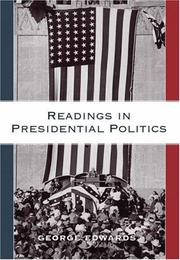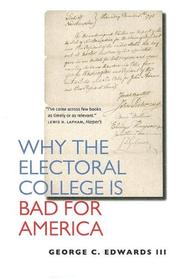| Listing 1 - 10 of 30 | << page >> |
Sort by
|
Book
ISBN: 0691170371 0691172013 140088098X Year: 2016 Publisher: Princeton University Press
Abstract | Keywords | Export | Availability | Bookmark
 Loading...
Loading...Choose an application
- Reference Manager
- EndNote
- RefWorks (Direct export to RefWorks)

ISBN: 9786611722944 1281722944 0300133626 9780300133622 0300115814 9780300115819 9780300100099 0300100094 9780300115819 6611722947 9781281722942 Year: 2003 Publisher: New Haven : Yale University Press,
Abstract | Keywords | Export | Availability | Bookmark
 Loading...
Loading...Choose an application
- Reference Manager
- EndNote
- RefWorks (Direct export to RefWorks)
American presidents often engage in intensive campaigns to obtain public support for their policy initiatives. This core strategy for governing is based on the premise that if presidents are skilled enough to exploit the "bully pulpit," they can successfully persuade or even mobilize public opinion on behalf of their legislative goals. In this book, George Edwards analyzes the results of hundreds of public opinion polls from recent presidencies to assess the success of these efforts. Surprisingly, he finds that presidents typically are not able to change public opinion; even great communicators usually fail to obtain the public's support for their high-priority initiatives. Focusing on presidents' personae, their messages, and the American public, he explains why presidents are often unable to move public opinion and suggests that their efforts to do so may be counterproductive. Edwards argues that shoring up previously existing support is the principal benefit of going public and that "staying private"-negotiating quietly with elites-may often be more conducive to a president's legislative success.
Communication in politics --- Rhetoric --- Presidents --- Public opinion --- Presidency --- Heads of state --- Executive power --- Political aspects --- History --- Public opinion.

ISBN: 1281722928 9786611722920 0300133618 9780300133615 0300100604 9780300100600 9781281722928 9780300100600 0300100604 Year: 2004 Publisher: New Haven, Conn. : Yale University Press,
Abstract | Keywords | Export | Availability | Bookmark
 Loading...
Loading...Choose an application
- Reference Manager
- EndNote
- RefWorks (Direct export to RefWorks)
Americans currently choose their president through the electoral college, an extraordinarily complex mechanism that may elect a candidate who does not receive the most votes. In this provocative book, George Edwards III argues that-contrary to what supporters of the electoral college claim-there is no real justification for a system that might violate majority rule. Drawing on systematic data, Edwards finds that the electoral college does not protect the interests of small states or racial minorities, does not provide presidents with effective coalitions for governing, and does little to protect the American polity from the alleged harms of direct election of the president. In fact, the electoral college distorts the presidential campaign so that candidates ignore most small states and some large ones and pay little attention to minorities, and it encourages third parties to run presidential candidates and discourages party competition in many states. Edwards demonstrates effectively that direct election of the president without a runoff maximizes political equality and eliminates the distortions in the political system caused by the electoral college.
Electoral college --- Presidents --- Election. --- Election --- United States
Book
ISBN: 9781009426275 1009426273 9781009426268 9781009426299 1009426257 1009426281 1009426265 9781009426251 9781009426282 Year: 2024 Publisher: Cambridge, England : Cambridge University Press,
Abstract | Keywords | Export | Availability | Bookmark
 Loading...
Loading...Choose an application
- Reference Manager
- EndNote
- RefWorks (Direct export to RefWorks)
The electoral college is the extraordinarily complex mechanism by which Americans choose their president. Is there any justification for such a system, which may elect the candidate who does not receive the most votes? Today, with two of the last five presidential elections having gone to the popular vote loser and the debacle following the 2020 election, the electoral college's flaws are more apparent than ever. In this fourth edition of the definitive book on the electoral college, George Edwards employs rigorous analysis and systemic data to show how the system violates core democratic principles and does not provide the benefits its advocates claim. With a new chapter focusing on the 2020 election, Edwards addresses justifications for the electoral college that were popular among Trump supporters following the 2016 and 2020 elections. Edwards concludes by offering a straightforward approach to selecting the president that maximizes political equality.
Electoral college --- Presidents --- Election.

ISBN: 049500670X 9780495006701 Year: 2006 Publisher: Belmont, CA: Thomson/Wadsworth,
Abstract | Keywords | Export | Availability | Bookmark
 Loading...
Loading...Choose an application
- Reference Manager
- EndNote
- RefWorks (Direct export to RefWorks)
Presidents --- Executive power --- United States
Book
ISBN: 9780226775814 022677581X 022677550X 9780226775500 Year: 2021 Publisher: Chicago: University of Chicago press,
Abstract | Keywords | Export | Availability | Bookmark
 Loading...
Loading...Choose an application
- Reference Manager
- EndNote
- RefWorks (Direct export to RefWorks)
"In George C. Edward III's Changing their Minds? Donald Trump and Presidential Leadership, Edwards looks at the microcosm of Donald Trump's first term as president and uses it to evaluate current theories of the power of presidential persuasion. Edwards contends that the idea of the bully pulpit-the argument that presidents have the ability to persuade the public and members of Congress to support their policies because of their office and the media attention they receive-is nonsense, and that the way presidents accomplish their goals is by identifying strategic opportunities-alliances with rising interest groups or the cultivation of members of Congress-to make progress on issues for which there is already support for the president's position. Edwards is critical of presidents who think they can successfully restructure the politics of the country. His argument is that Trump had relatively limited opportunities to change the dialogue around issues such as health care and has done a bad job of taking advantage of the opportunities that he has been offered, except on taxes. He also looks at the way Trump has dealt with Congress and, placing it in the context of scholarly work on presidential-congressional relations, shows why Trump has been a failure in dealing with the legislature"--
Presidents --- Political leadership --- Executive power --- Executive-legislative relations --- Trump, Donald, - 1946 --- -Presidents --- Trump, Donald, - 1946-

ISBN: 0300109687 Year: 2004 Publisher: New Haven Yale university press
Abstract | Keywords | Export | Availability | Bookmark
 Loading...
Loading...Choose an application
- Reference Manager
- EndNote
- RefWorks (Direct export to RefWorks)
Book
ISBN: 0300044046 Year: 1989 Publisher: New Haven : Yale University Press,
Abstract | Keywords | Export | Availability | Bookmark
 Loading...
Loading...Choose an application
- Reference Manager
- EndNote
- RefWorks (Direct export to RefWorks)
Presidents --- Political leadership --- Présidents --- Leadership politique --- Congrès (Etats-Unis)
Book
ISBN: 1280494573 9786613589804 1400841968 069115368X 0691163316 9781280494574 9781400841967 Year: 2012 Publisher: Princeton, N.J. : Princeton University Press,
Abstract | Keywords | Export | Availability | Bookmark
 Loading...
Loading...Choose an application
- Reference Manager
- EndNote
- RefWorks (Direct export to RefWorks)
When Barack Obama became president, many Americans embraced him as a transformational leader who would fundamentally change the politics and policy of the country. Yet, two years into his administration, the public resisted his calls for support and Congress was deadlocked over many of his major policy proposals. How could this capable new president have difficulty attaining his goals? Did he lack tactical skills? In Overreach, respected presidential scholar George Edwards argues that the problem was strategic, not tactical. He finds that in President Obama's first two years in office, Obama governed on the premise that he could create opportunities for change by persuading the public and some congressional Republicans to support his major initiatives. As a result, he proposed a large, expensive, and polarizing agenda in the middle of a severe economic crisis. The president's proposals alienated many Americans and led to a severe electoral defeat for the Democrats in the 2010 midterm elections, undermining his ability to govern in the remainder of his term. Edwards shows that the president's frustrations were predictable and the inevitable result of misunderstanding the nature of presidential power. The author demonstrates that the essence of successful presidential leadership is recognizing and exploiting existing opportunities, not in creating them through persuasion. When Obama succeeded in passing important policies, it was by mobilizing Democrats who were already predisposed to back him. Thus, to avoid overreaching, presidents should be alert to the limitations of their power to persuade and rigorously assess the possibilities for obtaining public and congressional support in their environments.
Executive power --- Political leadership --- Presidents --- Leadership --- Obama, Barack. --- United States --- Politics and government
Book
ISBN: 9780691139470 Year: 2009 Publisher: Princeton Oxford Princeton University Press
Abstract | Keywords | Export | Availability | Bookmark
 Loading...
Loading...Choose an application
- Reference Manager
- EndNote
- RefWorks (Direct export to RefWorks)
| Listing 1 - 10 of 30 | << page >> |
Sort by
|

 Search
Search Feedback
Feedback About UniCat
About UniCat  Help
Help News
News